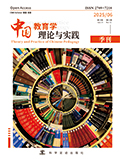

基于对晚清一个人的朱卷的具体分析, 包括了个人履历、师承关系、所考的试题内容及应答卷, 考官批语。应该说对朱卷的研究, 对研究历史人物、区域历史文化具有重要的史学价值。《童绍文乡试朱卷》源自顾廷龙编《清代朱卷集成》 (台北成文出版社出版, 1992年) 。童绍文 (1816—1860) , 字在兹, 又字子愔, 号见琴, 今浙江兰溪市人。金华府学增广生, 兰溪县民籍。该朱卷为清道光二十六年 (1846) 丙午科浙江乡试卷, 童绍文中式第五十四名举人。咸丰三年 (1853) , 癸丑科大挑一等, 钦分发河南省试用知县, 卒于官。生于嘉庆丙子年 (1816) 正月十一日卯时, 终于咸丰庚申年 (1860) 闰三月十二日酉时。今结合浙江兰溪市女埠街道虹霓山村《黄冈童氏宗谱》 (民国38年版) , 对其朱卷的个人履历、师承关系、策论进行注释, 以期凸现出其所具有的历史文化价值和史料价值, 从而为研究科举史、地方史、家族史提供一份重要的参考资料。
Based on a specific analysis of a person's Zhu-juan (red-ink copy of test papers used in imperial examinations) in the late Qing Dynasty, it includes personal resume, teacher-student relationship, the content and answers of the exam questions, and the examiner's comments. It should be said that the study of Zhujuan has important historical value for studying historical figures and regional historical culture. Tong Shaowen’s Zhu-juan written in Provincial examination originates from The Collection of Zhu-juan in the Qing Dynasty, which was compiled by Gu Tinglong and published by Taipei Chengwen Publishing House in 1992. Tong Shaowen (1816-1860) , also known as Ziyin and Jianqin, was born in Lanxi, Zhejiang Province today. He was the Zengguang scholar at prefectural school in JinHua, the civilian in registered residence in Lanxi County. This Zhu-juan is Zhejiang provincial examination paper written in 1846. Tong ranked 54th in the list of successful candidates. In the third year of Xianfeng (1853) , Tong Obtained first class in the Datiao examination selecing excellent candidates to become officials and served as the Supervisor of the County in Henan Province for trial use. He died while serving as an official. Tong was born on the eleventh day of the first month in the third year of the Jiaqing reign (1816) at Maoshi, and died on the twelfth day of the third month in the Gengshen year of the Xianfeng reign (1860) at Youshi. In combination with the Huanggang Tong's Genealogy (1949) from Hongnishan Village, Nubu Street, Lanxi City, Zhejiang Province, this paper annotates Tong’s Zhu-juan, including the personal resume, the teacher-student relationship, and the political ideas. The purpose is to highlight its historical and cultural value and historical data value, so as to provide an important reference for the study of imperial examination history, local history and family history.